Book proposals: What’s involved? How do you write them? Here are 14 tips from editors Emily Andrew of @McGillQueensUP, Randy Schmidt of @UBCPress and Dan Quinlan of @utpress. They’ll have more to say at a panel at #congressh in Toronto. A thread… 🧵 

1. Before you submit a book proposal, meet with an acquisition editor to form a relationship. This way when the proposal arrives it will have a face and a conversation attached. 🤝(@eandreweditor) #bookproposal
2. There is no protocol to contacting an acquisitions editor. Reach out to them by name. Our contact information is online, we will know many of your colleagues and peers, and we are approachable. Leverage mutual contacts and relationships. (Dan Quinlan, @utpress) 📧📞#Editors
3. Our jobs are to meet authors and find books. We WANT to talk to you about your book idea and often at very early stages. 🗣️(@randyubcp)
4. Reach out to an editor by email with a short description of your work, asking if they’d like to know more. If so, plan to meet at a conference. Otherwise, meet locally for a coffee or meet by Zoom. 📧🤝☕️💻(@eandreweditor) #meetup
5. Familiarize yourself with book lists from different presses and demonstrate that familiarity in your cover letter to an acquisitions editor. Relevant works, book series, etc. 📚(Dan Quinlan, @utpress) #catalogues
6. Feel free to make an initial contact with an editor even if your idea is tentative. This can often make for a productive entré and feed directly into your proposal. (Dan Quinlan, @utpress) #networking
7. A book proposal is different from a grant application or thesis prospectus. You need to quickly grab the attention of diverse people. The editors considering your proposal will be from different fields, and may be joined by marketing colleagues. (@eandreweditor) #Thesis
8. A book proposal is an indication of your ability to communicate your basic argument in a compelling, clear, and interesting way. A proposal is not the place to wow a publisher with theoretical sophistication or arcane language.🚫 (@randyubcp) #clearwriting
9. Write at the level of an educated general reader, as opposed to a specialist or colleague. Your aim is to communicate an idea clearly, not dazzle acquisition editors with your brilliance.😁(@randyubcp)
10. Acquisition editors are not subject specialists. Rather, we are examples of intelligent and curious lay readers. We need to understand what you are saying. 😕 (@randyubcp) #readibility
11. Know that it’s okay to have details related to your project that require dialogue and invite the editor to engage with you on these points. ✔️(Dan Quinlan, @utpress)
12. What is the story you want to tell? Why is it important? What is its central line of investigation? 🧐(@eandreweditor) #storytelling
13. An illustrative story or anecdote is often the best way to convey a subject focus. Begin your proposal with a story that will catch the reader’s attention and telescope into the focus of your work. (Dan Quinlan, @utpress) #stories
14. Do NOT send the abstract from your dissertation or, worse, the dissertation itself. If you are unsure if the project will suit a press, reach out with just a summary and ask if the acquisition editor if they would like to see a full proposal. 😉(@randyubcp) #Dissertation
Stay tuned for more tips from acquisition editors as we build up to “Book Publishing in Political Science” at the #Canadian Political Science Assn conference at 12pm on June 1, York University, Toronto. Next up: turning your PhD thesis into a book! 🎓📖 #cpsa2023
• • •
Missing some Tweet in this thread? You can try to
force a refresh

 Read on Twitter
Read on Twitter







